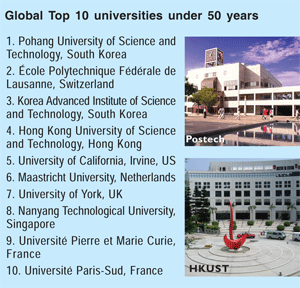For the second consecutive year, South Korea’s Pohang University of Science and Technology heads a list of the world’s top 100 universities under 50 years vintage. The UK’s “plate-glass” universities have lost ground.
 Founded in 1986, Pohang — better known as Postech — retains its top spot in Times Higher Education’s second annual 100 Under 50 Rankings, comfortably ahead of Switzerland’s École Polytechnique Fédérale de Lausanne in second place. Postech’s national rival, the Korea Advanced Institute of Science and Technology (Kaist), rises from fifth to third, while the Hong Kong University of Science and Technology (HKUST) drops one place to fourth.
Founded in 1986, Pohang — better known as Postech — retains its top spot in Times Higher Education’s second annual 100 Under 50 Rankings, comfortably ahead of Switzerland’s École Polytechnique Fédérale de Lausanne in second place. Postech’s national rival, the Korea Advanced Institute of Science and Technology (Kaist), rises from fifth to third, while the Hong Kong University of Science and Technology (HKUST) drops one place to fourth.
Only one UK institution — the University of York, at #7 — makes the top 10, compared with three last year. After York, the highest-placed UK institutions are the University of Warwick (#13), Lancaster University (#14) and the University of East Anglia (#16).
Overall, however, the UK still has the most representatives in THE’s Under 50 list, with 18 in the top 100 institutions. This is down from 20 last year, although one of 2012’s entrants —Keele University — is now too old to be included in the ranking. Other strong national systems include Australia (13 institutions), the US (eight), France (seven), Spain (six) and Taiwan (five).
But South Korea’s #1 and #3 spots make it the “star” of this year’s list, says Phil Baty, editor of Times Higher Education Rankings. “South Korea’s experience shows that it is possible for nations with sufficient political will to build in a relatively short time, world-class universities that can compete with the traditional elites in the US and the UK,” says Baty.
Overall, 28 countries make the list, eight of them in the top 10. THE’s 100 Under 50 is based on the same 13 performance indicators covering teaching, research, interaction with industry and internationalisation that underpin THE’s World University Rankings, although academic reputation is less significant.
The ranking provides a fresh perspective on the concept of the “elite university”, which some believe better reflects past glories and reputation built up over centuries than current academic excellence. Unsurprisingly, although the Sharif University of Technology, Iran is included among the global Top 100, not even one under-50 Indian varsity makes the league table.
Bond proposal ends policy stability
Universities have accused the government of reneging on a promise to deliver a period of “policy stability” on visas, after plans were revealed that could lead to bonds being demanded from international students to ensure they don’t overstay.
From November, under a pilot scheme, some visitors to the UK from “high-risk” countries could be asked to provide a bond worth hundreds of pounds, which will be returned only if they leave on time. The eventual scope of the pilot and size of the bond — intially reported as £3,000 (Rs.2.7 lakh) — are unclear after reports that prime minister David Cameron had not signed off the policy. However, a Home Office spokeswoman said in the longer term “ministers are interested in extending the principle to all visa types, including work and student visas, and all countries”.
Comments Daniel Stevens, international students officer at the National Union of Students: “We now have yet another far-reaching policy proposal, with no notice and no consultation, and for no real purpose beyond crude political point-scoring.”
The Tory-Libdem incumbent government has already made a series of changes to UK visa policy that some claim is putting off lucrative international students. For example, last year the automatic right to work in the UK for two years after graduation was rescinded. The number of applications to universities from outside the European Union has flattened out, with large drops from India offset by big rises from China.
In January, Mark Harper, the immigration minister, said universities were entering a period when there would be “a lot more policy stability”, but some see this latest announcement as shattering that peace. A spokesman for Universities UK said it had urged the government to consider the “unintended consequences” that such a move might have. “This is clear evidence that there is now a need for more joined-up thinking and better messaging in terms of international students,” he says, adding that “the government has also committed publicly to a period of stability in the student visa route.”
Dominic Scott, chief executive of the UK Council for International Student Affairs, points out that overseas students already have to prove that they have enough money to fund one year of tuition fees and nine months of living costs, likely to add up to at least £30,000 (Rs.27 lakh) in London. “The extra £3,000 bond is hardly going to be decisive should they think of staying on illegally,” he says. Although ineffective in deterring illegal immigrants, the bond could be “highly effective” as an “insult” to potential students and their parents, adds Scott.
The bond proposal has already been denounced in the Indian media as racist and discriminatory, with calls to impose a similar bond scheme on British visitors to India. Scott and Stevens also fear the bond will deter parents from attending their children’s graduation ceremonies, making the UK even more unattractive as a study destination. The bond is set to be trialled on visitors from six countries, likely to be India, Bangladesh, Sri Lanka, Pakistan, Nigeria and Ghana.
(Excerpted and adapted from Times Higher Education)